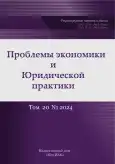International Sports Federationsand Their Place in the System of Subjects of Law
- Authors: Asadullin M.R.1
-
Affiliations:
- Ufa University of Science and Technology
- Issue: Vol 20, No 1 (2024)
- Pages: 84-88
- Section: Private Law (Civil) Sciences
- URL: https://journal-vniispk.ru/2541-8025/article/view/284292
- EDN: https://elibrary.ru/TIJLLK
- ID: 284292
Cite item
Abstract
The purpose of the study. The article is devoted to the legal status of international sports federations that carry out the functions of organizing a particular sport, as well as the problem of determining their place in the system of subjects of law. The dialectic of including international federations among the components of the Olympic Movement is obvious only at first glance, since this also emphasizes their autonomy, which does not allow mixing the IOC itself and sports federations, the nature of which is even more connected with those patterns, traditions, customs of specific territories and nationalities that once gave rise to the corresponding species sports. The content of the regulatory provisions of sports federations can be conditionally divided into a) introduced in the form of mandatory borrowing and b) related to the exclusive normative creativity of the federation itself (however, some other persons may be initiators (interested parties)). From the point of view of the regulatory effect, the provisions of federations can be divided into a) acting directly and b) requiring some kind of adaptation. Conclusions. International sports federations, on the one hand, form part of the unified Olympic movement, and, on the other, are clearly identified as a special body of organizations responsible for regulatory activities in specific sports. The main function of international sports federations, which ensures legal selforganization in the relevant sport, contributes to the preservation of ethno-cultural values. In this context, it is appropriate to return to the thoroughness of granting the all-Russian sports federations the right to independently approve the relevant rules of sports.
Full Text
##article.viewOnOriginalSite##About the authors
Murad R. Asadullin
Ufa University of Science and Technology
Author for correspondence.
Email: asadullin-murad@yandex.ru
SPIN-code: 8337-7367
Cand. Sci. (Law), Associate Professor of the Department of Political Science and Public Relations
Russian Federation, UfaReferences
- Alimov G.M. Outdoor games in the system of physical education of the Russian Empire (the second half of the XIX—beginning of the XX century) // Science and school. 2012. No. 4. pp. 172176.
- Alekseev S.V. International sports organizations in the Olympic law system// Sport. Right. Management. 2010. No. 4. pp. 2834.
- Alekseev S. V. International sports law : textbook/ edited by P. V. Krasheninnikov. M.: UNITY: Law and Law, 2012. 895 p.
- Vedeshkina T.P. The place and role of acts of all-Russian sports federations in the system of sources of labor law // Electronic appendix to the Russian Law Journal. 2020. No. 3. pp. 63-69.
- Vostrikova E.A. The legal nature of international sports organizations as international non-governmental organizations of a private nature// Modern law. 2011. No.7. pp. 140-144.
- Evseev S.V., Vyrupaev K.V. New approaches to the organization of adaptive sports in the Russian Federation. Moscow: Federal Sports Reserve Training Center, 2022. 46 p.
- Korchagin E.V. The legal status of a sports federation as a selfregulating organization in the light of changes in civil legislation on legal entities // Lawyer. 2015. No. 18. pp. 36-41.
- Simkin A.A., Konstantinov S.A. International sports federations as a system-forming factor in the development of the world Olympic movement//West Siberian Pedagogical Bulletin. 2014. No. 2. pp. 24-31.
- Suleimenov M.K. Law as a system. Almaty: Zanger, 2011. 344 p.
- Filippenko N.V. On the legal personality of citizens' associations on the example of the practice of the Constitutional Court of the Russian Federation//Law. 2017. No. 4. pp. 141-150.
Supplementary files








